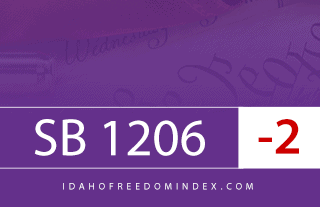



Bill Description: This bill would approve authority for $300 million in Grant Anticipation Revenue Vehicle, or GARVEE, bonds and establish a new Capacity, Safety, and Congestion Mitigation Program, providing funding from a distribution of sales tax revenues.
Rating: -2
Analyst’s Note: This bill would continue the dubious practice of handing over authority for debt to the Idaho Housing and Finance Association. Because IHFA is a corporate and politic independent body, the state constitution does not require a public vote on the debt. Such an arrangement, one could argue, prevents the public from having a say in the matter.
This bill also creates a new Capacity, Safety, and Congestion Mitigation Program, as was envisioned in previous versions of this legislation. The bill provides a funding source from a distribution of sales tax revenues (1 percent). This is closely aligned to a policy proposal from IFF starting in 2010 for the state to allocate at least 1 percent of general fund dollars for transportation. But this proposal isn’t quite on the mark, and funds transportation in a way that does not promote government transparency, as will be discussed shortly.
Does it increase government spending (for objectionable purposes) or debt? Conversely, does it decrease government spending or debt?
This bill gives the Idaho Housing and Finance Association (IHFA) the authority to issue $300 million in GARVEE bonds in order to finance new highway projects. (-1)
Does it in any way restrict public access to information related to government activity or otherwise compromise government transparency or accountability?
The bill allows a transfer of sales tax revenue to a special account prior to reaching the general fund. In doing so, the bill allows the state government to hide what would otherwise be properly characterized as a general fund expenditure, allowing general fund expenditures to appear lower than they actually are. Consider, for example, if the state were to do the same thing with an agency of state government, allocating sales tax revenues to accrue to the agency prior to their arrival in the general fund. Doing so would decrease general fund spending, even though nothing about the agency’s spending had changed. This type of funding arrangement sets a bad precedent and reduces government accountability and transparency. (-1)


